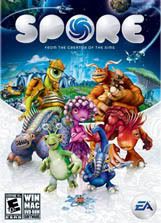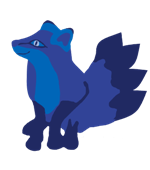
Genre: Sim/God-Game
Publisher: Electronic Arts
Developer: Maxis
ESRB Rating: E for Everyone
Price: $49.99 USD
US Release Date: September 7, 2008
Equipment: Windows XP Pro PC, Intel Core 2 Duo E6400 @ 2.13 GHz, Nvidia GeForce 8800 GTS 512MB, 2GB RAM, HP 23" widescreen monitor @ 1920x1200
Completion: Approximately 15 hours to reach the 10th rank in Space Stage.
Don't call it Sim Spore, but don't call it the Second Coming, either.
Spore allows the player to create an organism and follow it from the tide pool all the way to space. Along the way, simple and intuitive yet robust editors give the player control over how their creatures look, what they wear; where they live, work, and play; the type of vehicles they pilot, and even the style of spaceship they launch to explore the galaxy.
The heart of Spore is the editors that allow the user to create nearly everything in the game. Beginning in the Cell Stage, options in the creature editor are rather limited. Once the creature steps out of the water, though, the only limiter is the player's imagination. There are a large number of limbs, hands, feet, eyes, ears, mouths, noses, wings, and other things to make a creature unique, and they can all be painted in any color of the rainbow. Upon reaching the Tribal stage, the creature design is set, and the editor changes to accessories: backpacks, head wear, masks, and armor. The editor changes again in the Civilization Stage, allowing the player to make buildings for their creatures: homes, workplaces, entertainment centers; as well as their transportation: land, air, and sea. Finally, the Space Stage editor gives numerous options for galactic travel. All the other creatures and civilizations in the game are created by other players, and are distributed over the EA network.
While the ultimate goal is space, each of the five stages has distinct gameplay and objectives. The Cell Stage is all about eating enough plants or meat to get bigger and stronger and eventually make it to land and the Creature Stage. Here, the objective is to further the development of the species by banding together in packs and hunting or befriending other packs of creatures. The pack will migrate over time to bigger and better nests, allowing a larger pack. Once the pack is large enough, they will form a tribe. In the Tribal Stage, the focus is less on the individual creature and more on the interactions between tribes. Again, those interactions can be hostile in order to eliminate other tribes, or friendly so they will be allies. After the other tribes have been conquered or befriended, the Civilization Stage begins. The user's creatures form a city and send out recon units to gather spice in order to fund their new-founded empire. They can use this spice to trade with other cities and eventually buy them out peacefully, or take the opponent's spice fields by force and crush enemy cities with military units. Only after the entire planet belongs to the player does the Space Stage begin. The player's civilization launches a spaceship that can be used to explore the galaxy, terraform new planets and colonize them, buy, sell, and trade with other space-faring nations, or go to war with and conquer them.
Everything to do in Spore is handled with an easy control scheme that is simple and mostly intuitive: left click to move or attack, right click to select, hold to swing the camera around, and scroll the mouse wheel to zoom in or out. The editors are equally easy to use.
In every stage of the game, Spore looks great. The game is fully 3D, with bright, vibrant colors and fully detailed environments. Animals and structures are all user-created, but plant life is not. Even so, there is almost an unlimited variety of species of plant ranging from tiny grasses to gigantic trees. In the Space Stage, the first time zooming out from the planet's surface into space, then into the solar system, and eventually seeing the entire galaxy on screen is breathtaking.
One of the truly groundbreaking things about Spore is its procedurally-generated animation and music. Not only does the game generate animation on the fly for how any given creature will move, but it does the same with music, depending on the types of parts that were used to create those creatures. It works surprisingly well.
What doesn't work so well is the Space Stage. It's designed as the ultimate sandbox, allowing for go-anywhere, do-anything gameplay, but it doesn't completely deliver on that promise. Yes, it's possible to change everything about a planet, from its atmosphere level and temperature, to the color of the soil and water, to the type of plants and animals that live on it, and even the shape of the planet itself. However, given the fact that there are perhaps millions of planets in the galaxy, the idea of modifying planets to this degree quickly loses its appeal. Space also provides the option of interacting with other empires by completing missions for them. These missions have a few basic categories: FedEx (collect and deliver), recon (scan a plant or animal species and bring back the information), or extermination (eliminating diseased animals); in which there is a bit of variation, but not enough to keep them fresh for very long. Then there's expansion. Just like in the other stages, there are two ways to expand: by establishing trade routes and eventually buying out other star systems or eliminating the inhabitants and taking over their planets. Trading with and ultimately purchasing new territory takes a long time and is very expensive. War is less costly outright, but finishing one, especially against a large empire, can take just as long, if not longer than trading. The reason for this is that anytime the player is at war, their existing colonies will be attacked by the enemy constantly, forcing the player to return and micromanage them by rebuilding turrets, buildings, and sometimes entire cities. Lastly, there's the overall objective of reaching the center of the galaxy, which is unfortunately protected by a gigantic, extremely hostile empire. Simply flying too close to one of their star systems brings an immediate declaration of war. The actual act of attempting to fly through their territory in order to get to the galactic core is an exercise in futility.
Spore is ambitious, ground-breaking, interesting, frustrating, and unpolished. There is so much potential that isn't fully realized. Some parts of the game are genius and inspired, while others are baffling and inexplicable. Procedurally-generated animation and music is the future of gaming, but Spore has too many issues to be considered a classic game.
Heath Says:
There were parts of Spore that I had a lot of fun with (such as the creature creator), and there were parts of Spore that I had the opposite of fun with (such as much of the Space stage). I liked the Space stage at first, until I realized that anytime I was at war with anyone it meant I would constantly be micromanaging my colonies. At one point, I just began ignoring my people's pleas for help, until I realized that they literally had no defenses (even with turrets and attack vehicles) against the enemy. If I didn't rush back to help them, the enemy spaceships would continue blasting away at my colonies until they glassed the entire planet. Don't even get me started on trying to reach the center of the galaxy. It's impossible; which is not to say that no one has done it, but it takes much more luck than skill to achieve.
There's also the issue of the DRM included with Spore, in that it requires online authentication, and the number of installs are limited. What happens if the servers required for authentication ever shut down or the install limit is reached is anyone's guess. Be sure to check out Kitsune Game's article on DRM in games for a more in-depth discussion of the issue.
Perhaps my biggest complaint about the game is one that I never thought I would levy: Spore is in fact a game with structure, objectives and advancement towards an ultimate goal, but I think I would prefer it if there was a pure sandbox mode included. The Space stage is like a sandbox, but it has a lot of roadblocks. I would love a freeplay mode that became unlocked after finishing the Space stage that allows you to go back and revisit any part of the game with no limits of any kind. Sadly, that isn't the case, and now that I've played through Spore once, I have no desire to play through it again.
Final Verdict:

Second Take by NordicRev:
Spore promises an entire universe in a box. What you really get is an endless character creator with flat, repetitive, and ultimately boring game play.
Expect anything in the game to have lasting effects on your species? Expect disappointment. Your species doesn't evolve based on what you've chosen. You just randomly add new parts as you see fit. Bored with having four legs? Add four more! One head not enough? Add three more then change it two minutes later if you want more or less! And if you think that having extra legs helps your speed or that extra claws would help your ability to kill things you'd be about as wrong as the banks were when they thought sub-prime mortgages were a slam-dunk investment.
Fundamentally, the problem with Spore is that all game play in all of the sections is the same and by the time you get to the Space Stage you're already feeling like the game is passé:
In Cell Stage you gather red bits, green bits, or both and fend off other creatures by killing them and collecting their parts.
In Creature Stage you either become a predator (red bits) or a social animal (green bits) and collect body parts when you defeat/befriend the other creatures.
In the Tribal Stage you develop technology to either woo the other five tribes (exactly five every time) with music (green bits) or spear them to death (red bits).
Then you're in the Civilization Stage and get a little variety!
In the Civilization Stage you can build tanks and kill cities (red bits) or build cars to take missionaries and convert cities (green bits) or build caravans and trade with cities until you can buy them. Regardless of what you choose at this stage your only goal is: get airplanes, build your flavor of airplane (trader plane, evangelist plane, or fighter plane), and throw as many planes as possible against a city until you take it over. If a plane dies, you click on a city and press a button and a new plane appears instantly.
This is where I lost interest.
The Space Stage (what little I played) doesn't seem much different except that there's more micromanaging without the luxury of trading for spice.
For anyone looking for the complex choices of Civilization or actual strategy, Spore does not deliver. Really there are better games for every section of Spore. All of the parts of Spore, when taken together, do not transcend into the title of greatness or even just good. Unless you're the type of person that thinks most games go downhill after you're done with character creation this game amounts to a $50 flash in the pan. You'll play it, have penis shaped creatures with names like "whatyourmomsawlastnight" streamed to your universe from other players' accounts (thank you, Internet!), and shrug.


No comments:
Post a Comment